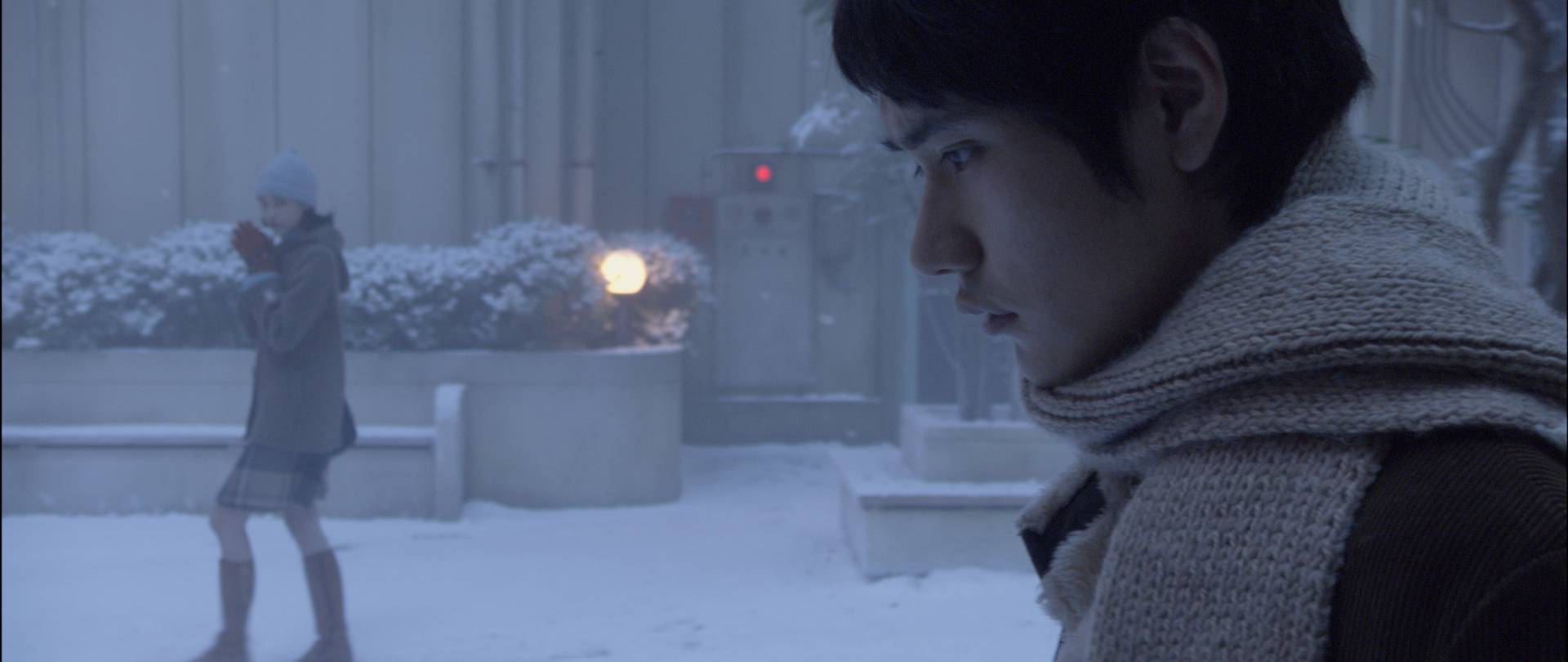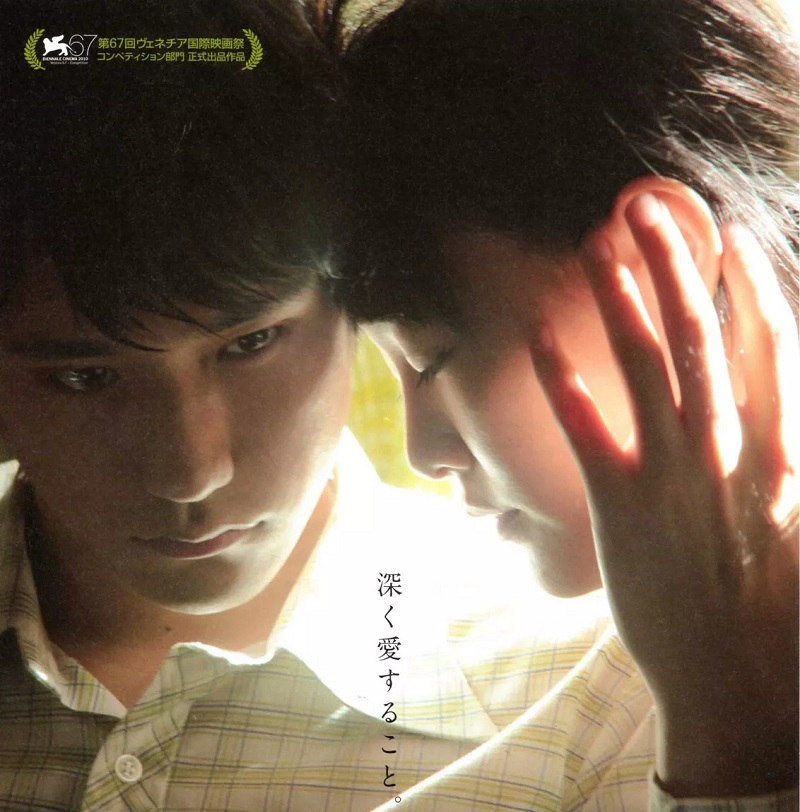Here are our impressions of the film Norwegian Wood, directed by Trần Anh Hùng based on the fifth novel by Japanese writer Haruki Murakami, published in 1987 in Japan. Film of extreme visual quality that uses, as usual of the Vietnamese director, symbols, situations, songs, camera games to optimize the interaction with the viewer. All these elements plunge us into an atmosphere as intimate as it is disturbing, it touches us, embarks us, as if a friend told us the story of his life.
Synopsis
The story, told in voice-over by Toru, revolves around his youth, the discovery of sexuality, friendship. Consequences of suicide. Naoko, Toru, and Kizuki are very good friends. Naoko and Kizuki have known each other since childhood and love each other. One day and for no apparent reason, Kizuki commits suicide. Overwhelmed by grief, Toru decides to study in Tokyo. A few years later, he meets Naoko again, disturbed and unstable and falls in love with her. But after their first night, the girl disappears without a trace and Toru is again confronted with the loss of a friend. Naoko ends up writing to him from a sanatorium in the middle of the forest in Kyoto. Unable to love Toru and disturbed by Kizuki's inexplicable suicide, she gradually descends into madness before Toru's helpless eyes. That's when he meets Midori, pretty and sure of herself. He will have to choose between the two girls. Its past and future.
distribution
Rinko Kikuchi as Naoko Ken'ichi Matsuyama as Toru Watanabe Kiko Mizuhara as Midori Tetsuji Tamayama as Nagasawa Kengo Kôra : Kizuki Reika Kirishima : Reiko Ishida Eriko Hatsune : Hatsumi Shigesato Itoi : Drama teacher Tokio Emoto Takao Handa : Midori's father
Technical fact sheet
Title: The Ballad of the Impossible, Noruwei no mori (Original title), Norwegian Wood Director: Tran Anh Hung Writers: Tran Anh Hung (based on Haruki Murakami's novel The Ballad of the Impossible) Music: Jonny Greenwood Photography: Mark Lee Ping-Bin Country: Japan Language: Japanese Release date: May 4, 2011 (France) September 2, 2010 (Venice) December 11, 2010 (Japan) Filming locations: Tokyo, Tonomine, Mineyama Highlands and Kasumi Coast, Japan Duration: 133 min 
Criticism and impressions
Parallelism between John Lennon's song and the film
During the 60s, John Lennon wrote a song about infidelity very subtly. It is obvious that he did not want his first wife to know or grasp the true meaning. He says "having had a wife" or that it was rather that it was "she who had it, since it was she who took the initiative". She asks him to sit anywhere and that's when he notices that there is no chair. So he sits on a carpet that is on Norwegian wood. This small observation at the end of the paragraph probably alluded to the parquet of this matter, very fashionable in the 60s. That said, on John Lennon's part, the meaning can be quite another. And then… first relationship between Naoko and Toru on this floor which seems cold and unraveled from any romanticism. And then, as in the song, she is the one who takes the initiative.
Choice of title
It is clear that the choice of title is not trivial. A Beatles song immediately marks an era. It has the power to immerse us in a period, sparing an exhaustive description of the situation, allowing our brain to integrate immediately into this same situation. The different styles of the Beatles have fit well in time. At that time, George Harrison had just discovered the zither and introduced it for the first time in the song "Norwegian Wood". This is a very ingrained detail and absolutely inherent to the 60s. This same zither only confirms this contemplative cloud that colors the film with a strange and at the very least singular atmosphere of uncertainty. Beatles. George Harrison (and the whole planet) in search of enlightenment. 60s. Vietnam War. Japanese youth revolt against a conservative and traditionalist system, seek a way to assert themselves, discover sexuality without taboos, express their defeat through the influences of the moment. It is the very methodical picture of an era that will change minds forever. But… Is Norwegian Wood's goal to portray a time of transition and malaise or is it the chronicle of a suicide, with all that entails? Wouldn't the common thread be this sexuality very characteristic of an external revolution but especially of an inner focus? Do we seek through this sexuality to take root and find our bearings? Naoko can not make love, she flies victim of his demons like Toru who seems to gain confidence every time he has sex. 
Tran Anh Hung: Style rich in symbols
The choice of songs plays a key role in the context that Tran Anh Hung wanted to give to the film. Vietnamese director of the surprising and singular "I come with the rain", he strives as usual to meticulously represent events without taking gloves. Even if his style is very twisted and quirky as in his previous film, and he often uses symbols, once the puzzle is completed, reality jumps out at you. She even crunches them from you. It's really a parallel to the form John Lennon used his texts. Most of the time, only he knew what he was talking about!
Choice of songs
After the disappearance of Naoko, the incomprehension of Toru is translated rather than described, by the anxious and hypnotic atmosphere of the German group CAN. The repetitive rhythms of the bass and drums put us in front of the distress of the young man and his will to move forward. They introduce us to the heart of Naoko's deteriorating mental health. Norwegian Wood is not a simple love story but rather a very raw description of suicide, its consequences. Landscapes ("Could Wood" refer to the forest instead?) Magnificent that explode the unspoken, a very sensual sexuality but very awkward limited by the age of the characters. Each element arrives on the screen without forgetting the slightest detail. Norwegian Wood, Naoko's favorite song, gives its title to a film that speaks of the loss, not only of the loved one, but of an innocence trampled by the outpouring of the conjuncture and its consequences. The scene where Toru and Midori go around in circles and shifted around the room is obvious. We look for each other but we can't find each other. Or the reference to Thomas Mann's book, The Magic Mountain. Toru is reading this novel during his first visit to Naoko in the forest. Naoko and the patients of the magic mountain all yearn for salvation by isolating themselves from society. Can they find it? 
Paul McCartney…
Paul McCartney added a very small contribution to the song by advising John Lennon to set fire to the piece which, unfortunately, falls like a hair on the soup and breaks the nonchalant climate of the composition. "And when I woke up, I was alone. This bird flew away. So I lit a fire, is that good? Norwegian wood". Toru screams in pain in the midst of a powerful nature. By her act, Naoko set fire to her heart. Its cries are as impressive as the raging waters of the sea seeping into the rocks. And then, a good Asian habit, after the disaster, flat calm. It's time to breathe.
CAN
Once again, Tran Anh Hung chose Jonny Greenwood for the soundtrack and graces us with very good songs from the first album of Can, German experimental rock and psychedelic rock band. Under the influence of singer and sculptor Malcolm Mooney, their compositions perfectly fit the atmosphere (marry it or create it?) and with the help of the genius Mark Lee Ping-Bin, director of photography of Wong Kar-wai, they make the forest greener and inaccessible, the love scenes more carnal. But also perpetuate the lack of oxygen, the fog that has settled since Kizuki's suicide. The choice of Can, further confirms this need for the detail of Tran Anh Hung. As in a treasure hunt, he leaves us clues, adds brushstrokes sung by a Malcolm Mooney in the middle of a nervous breakdown who must, shortly after, leave the group to spare his sanity. An obvious parallelism with the state of Naoko.
A liberating end for Norwegian Wood
The film is narrated by Toru in the first person. All the vagaries of life forge him, make him the man he has become. We witness its evolution and are proud of its ultimate decision. Very serious events can sink a person but can also make them stronger. This is the very liberating moral that materializes the moment we hear John Lennon singing in the credits, as falsely carefree as usual.
Soundtrack
"Bit About Yourself, You Want to Properly" "Meadows, Wind, Groves" "Mary, Mary, So Contrary", Can "Since I'll Come to See You Again" "Don't Read Things That Have Not Had The Baptism of Time" "Reiko" "Bring Me Coffee or Tea", Can "Naoko Has Died" "Shut Up Like a Good Boy" "I Walked About Aimlessly" "Quarter Tone Bloom" "Don't Turn the Light On, Leave Me Alone", Can "When You Take Me, Take Only Me" "Severe Auditory Hallucinations" "Indian Sumer", The doors "Deadlock", Can Professor: The myth of Andromache tells the story of an inalienable love and its tragic consequences. Student: The University of Baseda is on strike. This is the war in Vietnam. There is more important than the Greek tragedies. Teacher: I do not believe that there is a more important subject in the world than the Greek tragedies. But do as you wish.




































